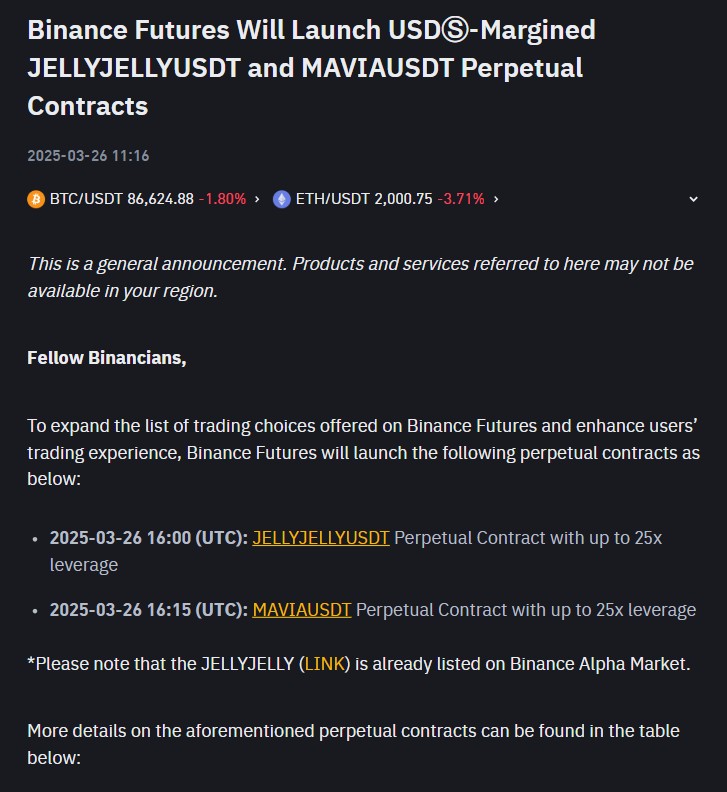Gracy Chen, CEO of cryptocurrency exchange Bitget, criticized Hyperliquid’s handling of a March 26 incident on its perpetual exchange, saying it put the network at risk of becoming “FTX 2.0.”
On March 26, Hyperliquid, a blockchain network specializing in trading, said it delisted perpetual futures contracts for the JELLY token and would reimburse users after identifying “evidence of suspicious market activity” tied to the instruments.
The decision, which was reached by consensus among Hyperliquid’s relatively small number of validators, flagged existing concerns about the popular network’s perceived centralization.
“Despite presenting itself as an innovative decentralized exchange with a bold vision, Hyperliquid operates more like an offshore [centralized exchange],” Chen said, after saying “Hyperliquid may be on track to become FTX 2.0.”
FTX was a cryptocurrency exchange run by Sam Bankman-Fried, who was convicted of fraud in the US after FTX’s abrupt collapse in 2022.
Chen did not accuse Hyperliquid of specific legal infractions, instead emphasizing what she considered to be Hyperliquid’s “immature, unethical, and unprofessional” response to the event.
“The decision to close the $JELLY market and force settlement of positions at a favorable price sets a dangerous precedent,” Chen said. “Trust—not capital—is the foundation of any exchange […] and once lost, it’s almost impossible to recover.”
Source: Gracy Chen
Related: Hyperliquid delists JELLY perps, citing ‘suspicious’ activity
JELLY incident
The JELLY token was launched in January by Venmo co-founder Iqram Magdon-Ismail as part of a Web3 social media project dubbed JellyJelly.
It initially reached a market capitalization of roughly $250 million before falling to the single digit millions in the ensuing weeks, according to DexScreener.
On March 26, JELLY’s market cap soared to around $25 million after Binance, the world’s most popular crypto exchange, launched its own perpetual futures tied to the token.
The same day, a Hyperliquid trader “opened a massive $6M short position on JellyJelly” and then “deliberately self-liquidated by pumping JellyJelly’s price on-chain,” Abhi, founder of Web3 company AP Collective, said in an X post.
BitMEX founder Arthur Hayes said initial reactions to Hyperliquid’s JELLY incident overestimated the network’s potential reputational risks.
“Let’s stop pretending hyperliquid is decentralised. And then stop pretending traders actually [care],” Hayes said in an X post. “Bet you $HYPE is back where [it] started in short order cause degens gonna degen.”

Binance launched JELLY perps on March 26. Source: Binance
Growing pains
On March 12, Hyperliquid grappled with a similar crisis caused by a whale who intentionally liquidated a roughly $200 million long Ether (ETH) position.
The trade cost depositors into Hyperliquid’s liquidity pool, HLP, roughly $4 million in losses after forcing the pool to unwind the trade at unfavorable prices. Since then, Hyperliquid has increased collateral requirements for open positions to “reduce the systemic impact of large positions with hypothetical market impact upon closing.”
Hyperliquid operates the most popular leveraged perpetuals trading platform, controlling roughly 70% of market share, according to a January report by asset manager VanEck.
Perpetual futures, or “perps,” are leveraged futures contracts with no expiry date. Traders deposit margin collateral, such as USDC, to secure open positions.
According to L2Beat, Hyperliquid has two main validator sets, each comprising four validators. By comparison, rival chains such as Solana and Ethereum are supported by approximately 1,000 and 1 million validators, respectively.
More validators generally lessen the risk of a small group of insiders manipulating a blockchain.
Magazine: What are native rollups? Full guide to Ethereum’s latest innovation
Read the full article here

